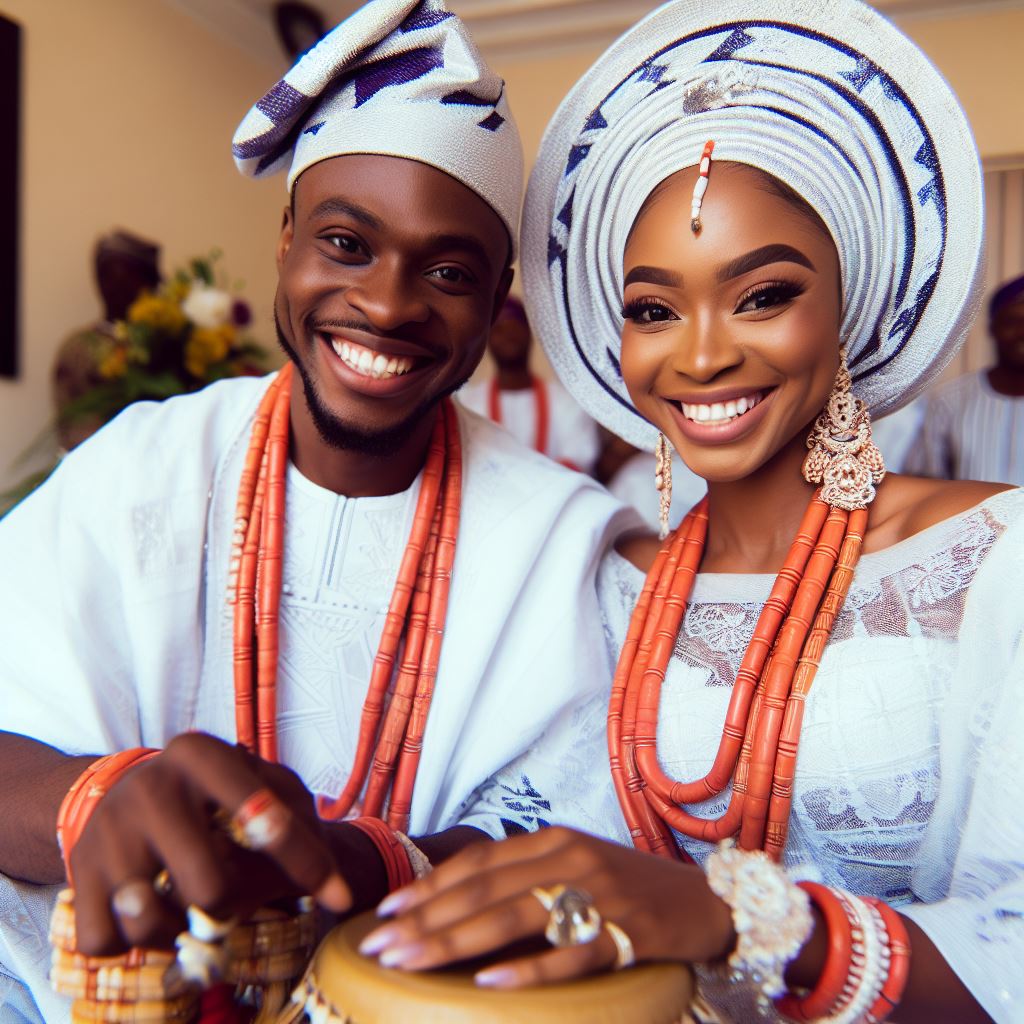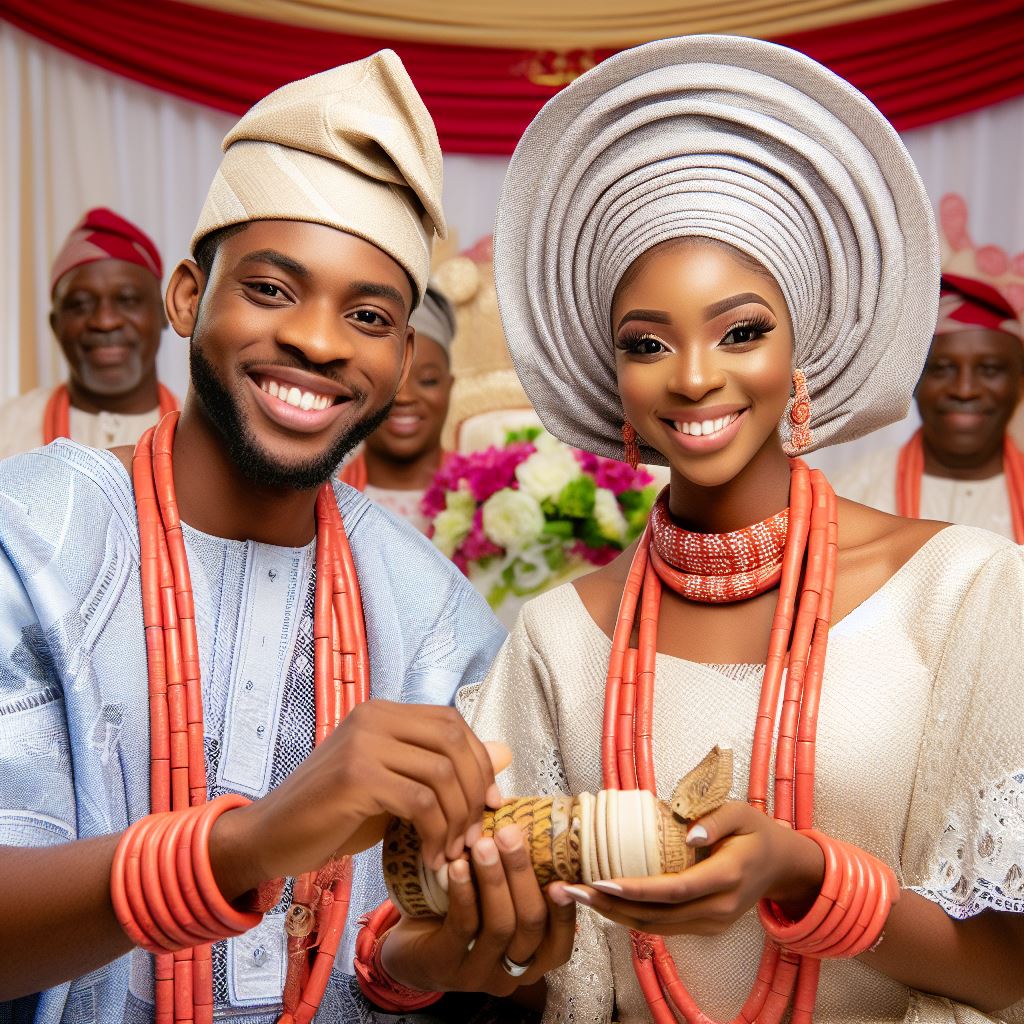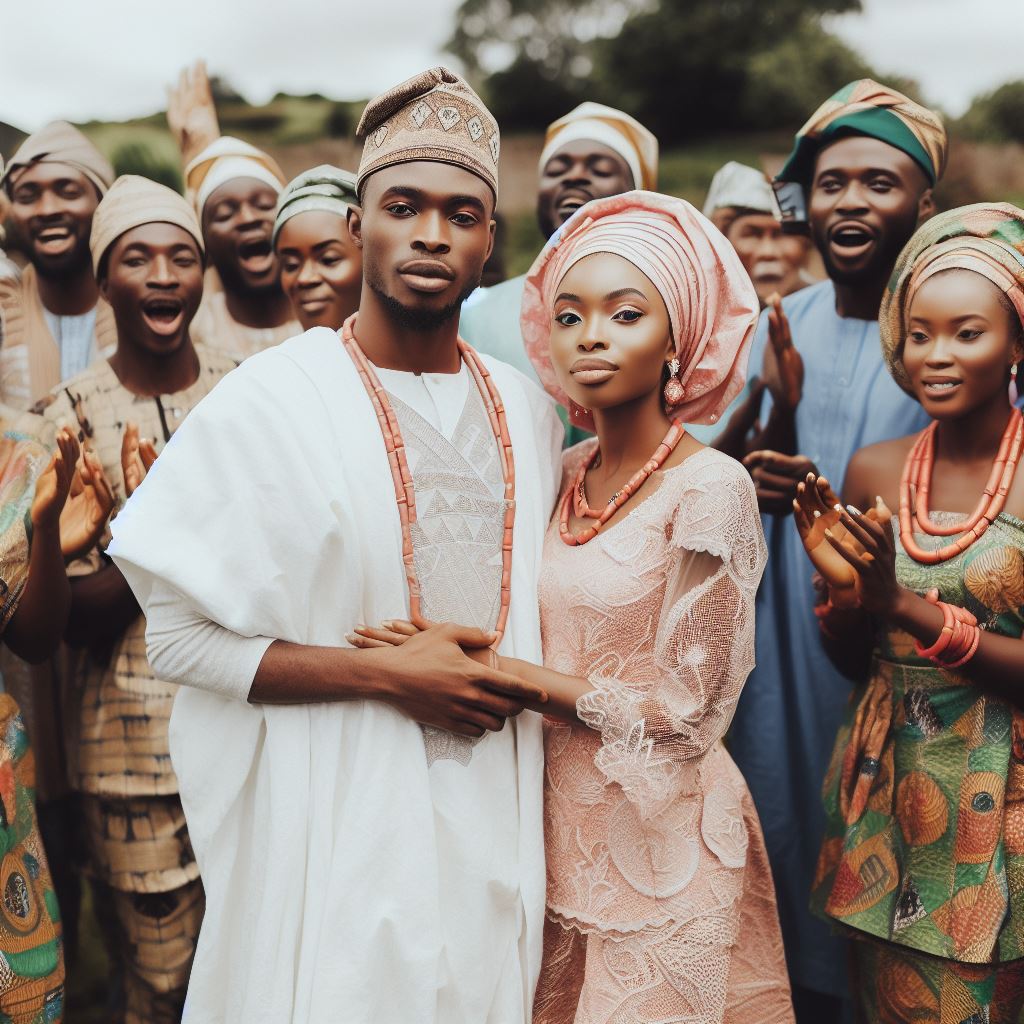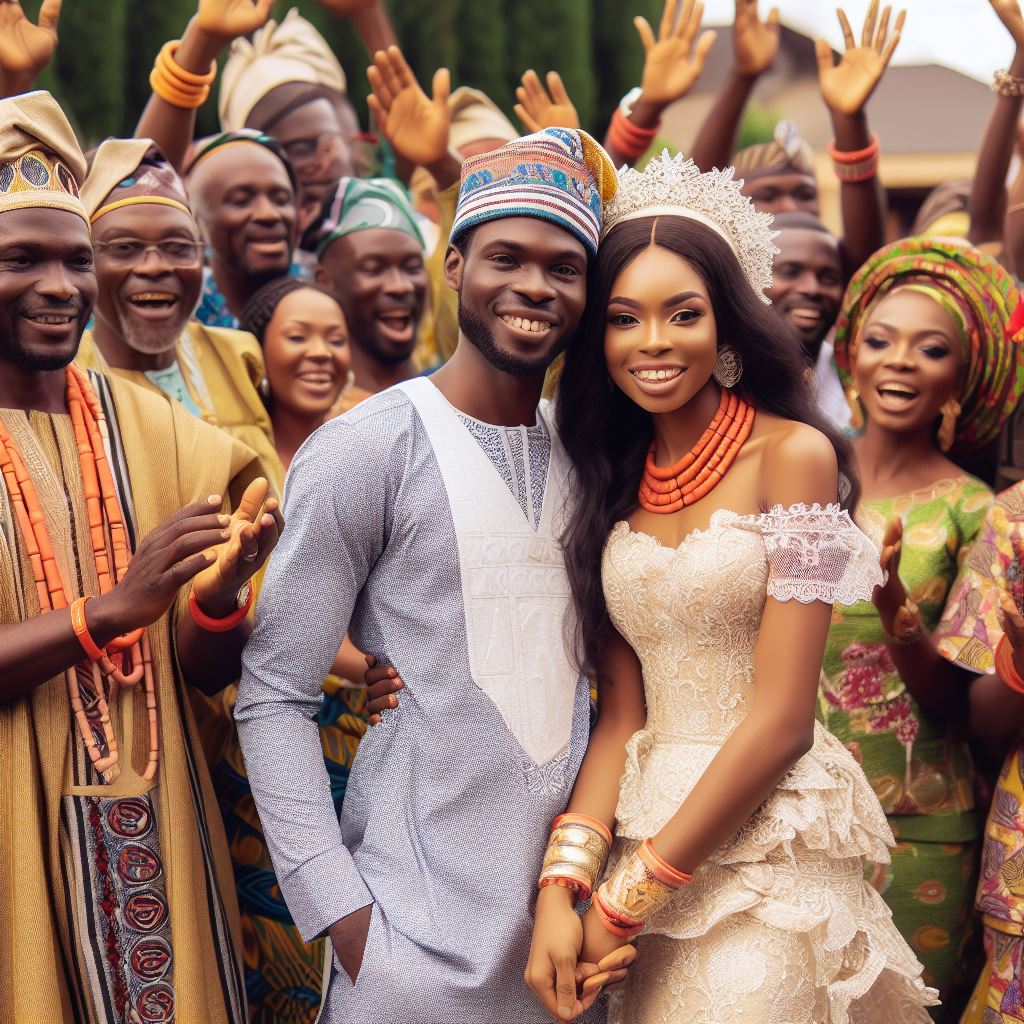Introduction
Dowry (Mahr) in Islam
Dowry, known as Mahr in Islam, is a pivotal component of Islamic marriages.
It’s not just a formality but a legal and ethical obligation.
Significance of Dowry
Mahr signifies commitment, respect, and financial security, underlining the sanctity of the marital union.
It acts as a symbol of the groom’s sincerity and responsibility towards his bride.
Nigerian Practices
In Nigeria, Islamic weddings uphold the Mahr tradition, reflecting a blend of culture and faith.
The Nigerian Islamic community values this practice for its role in strengthening family ties.
Islamic law requires the groom to offer a Mahr, a specified sum of money, possessions, or assets to the bride as part of the marriage contract.
This financial offering serves as a safeguard for the bride’s future, ensuring her financial security even if the marriage dissolves.
The Mahr also symbolizes the respect and honor the groom bestows upon his bride. It is a clear indication of his commitment to provide for her and safeguard her interests.
In Nigerian Islamic traditions, the Mahr can take various forms. It may include money, jewelry, property, or other valuable items as agreed upon by the couple and their families.
The Mahr isn’t just a financial transaction; it’s a deeply meaningful tradition that emphasizes mutual respect, love, and commitment in Islamic marriages.
In the Nigerian context, it’s a beautiful fusion of Islamic principles and cultural values, adding depth and richness to the marital journey.
In this blog post, we’ll delve deeper into the concept of Mahr in Islam, exploring its historical roots, legal implications, and the various ways it is practiced in Nigeria.
Meaning and Definition of Dowry (Mahr) in Islam
Explanation of the term “Mahr”
- In Islam, Mahr refers to the mandatory gift or payment given by the groom to the bride.
- It is a symbol of respect and honor towards the bride and is considered her exclusive right.
- Mahr can be in the form of money, property, or any valuable assets agreed upon by both parties.
Understanding the concept of dowry in Islamic teachings
- In Islamic teachings, the dowry symbolizes the husband’s responsibility to support his wife financially.
- It serves as a show of commitment and helps establish a strong foundation for the marital relationship.
- The dowry is not a price or purchase of the bride, but rather a means of protection and honor.
Importance of dowry as a financial security for women
- The dowry plays a crucial role in ensuring the financial security and independence of women.
- It provides a safety net for women in case of divorce, widowhood, or any unforeseen circumstances.
- The dowry empowers women, giving them a sense of ownership and control over their financial affairs.
Comparison between dowry and bride price
- Dowry and bride price are two different concepts prevalent in various cultural practices.
- Dowry is paid by the groom to the bride, while bride price is paid by the bride’s family to the groom.
- Dowry ensures the financial security of the wife, whereas bride price is a form of compensation to the groom.
- Dowry emphasizes the bride’s rights and dignity, while bride price can sometimes lead to the commodification of women.
- In Islam, dowry is the recommended practice, focusing on equality, respect, and the well-being of women.
Basically, the concept of dowry (Mahr) in Islam holds significant meaning and importance.
It represents a valuable gift from the groom to the bride, symbolizing respect, commitment, and financial security.
Unlike bride price, dowry prioritizes the rights and dignity of women, aiming for equality within the marital relationship.
The dowry system in Islam plays a vital role in safeguarding women’s financial independence and providing them with a sense of ownership and control over their lives.
Read: How to Prepare for a Halal Muslim Wedding in Nigeria
Nigerian Cultural Context
Overview of the Nigerian culture and customs
Nigeria is a diverse country with over 250 ethnic groups, each with its own unique culture and customs.
The country is known for its rich cultural heritage, vibrant music, and colorful festivals.
The role of Islam in Nigerian marriages
In Nigeria, Islam is one of the major religions, accounting for about 50% of the population.
Islamic teachings play a significant role in Nigerian marriages, shaping the customs and practices followed.
Intertwining of traditional practices with Islamic teachings
In Nigerian marriages, traditional practices are often intertwined with Islamic teachings.
While Islamic teachings emphasize the importance of consent and mutual respect, certain cultural practices may contradict these principles.
Prevalence of dowry as a common practice in Nigeria
Dowry, also known as Mahr, is a common practice in Nigerian marriages.
It is the amount of money or property agreed upon by the groom and the bride’s family before the marriage is solemnized.
Generally, Nigerian culture and customs, influenced by Islam, have shaped the prevalence of dowry in Nigerian marriages.
While Islamic teachings aim to foster consent and respect, traditional practices sometimes contradict these principles.
Understanding this cultural context is essential to address dowry practices in Nigeria effectively.
Read: The Importance of Nikah: Marriage in Islamic Tradition
Uncover the Details: Preparing for Your First Marriage Counseling Session in Nigeria
Nigerian Dowry (Mahr) Practices
Customary dowry practices in various Nigerian regions
- In the northern regions of Nigeria, dowry is commonly known as “Sadaki” and consists of cash payments and gifts.
- In the southern regions, the dowry is often referred to as “UmuAda” or “Oko” and includes different items such as livestock, clothing, and household goods.
- In the eastern regions, the dowry is called “Lobola” and is typically paid in the form of cash, livestock, or other valuable assets.
- In the western regions, dowry is known as “Owo Oriki” and is usually paid in cash, crop produce, or goods such as furniture and electronics.
- While the specific items and customs may vary, dowry practices are prevalent throughout Nigeria and hold significant cultural importance.
Different forms of dowry in Nigerian society
- As a predominantly Muslim country, Islam plays a significant role in shaping dowry practices in Nigeria.
- In Islamic marriages, the dowry or “Mahr” is a mandatory payment from the groom to the bride.
- Alongside Islam, other cultural and traditional beliefs also influence dowry practices in Nigeria.
- Some communities require dowry payments to establish the groom’s commitment and financial capability.
- In certain regions, the dowry serves as a symbol of respect and honor for the bride’s family.
The negotiation process and determining the dowry amount
- The negotiation of the dowry amount is often carried out between the groom’s family and the bride’s family.
- Both parties discuss various factors, such as the social status, education, and reputation of the groom and bride.
- Financial factors, including the groom’s income and ability to provide for the bride’s needs, also influence the dowry amount.
- Although the negotiation process varies, it typically involves mutual agreement and respects the wishes of the bride and groom.
- The agreed-upon dowry amount is finalized and presented during the wedding ceremony.
Reflection of societal values and changing trends in dowry practices
- Dowry practices in Nigeria reflect the importance placed on marriage and family unity.
- In recent years, there has been a shift towards reducing dowry amounts to avoid financial burdens on the groom’s family.
- Some modern couples opt to forgo dowry payments or replace them with symbolic gestures to highlight equality and love in their marriages.
- Changing societal norms and gender roles have also influenced dowry practices, with some women asserting their right to reject excessive dowry demands.
- Essentially, Nigerian dowry practices continue to evolve, balancing tradition, cultural values, and individual preferences.
Read: Changing Times: Millennial Perspectives on Marriage in Nigeria
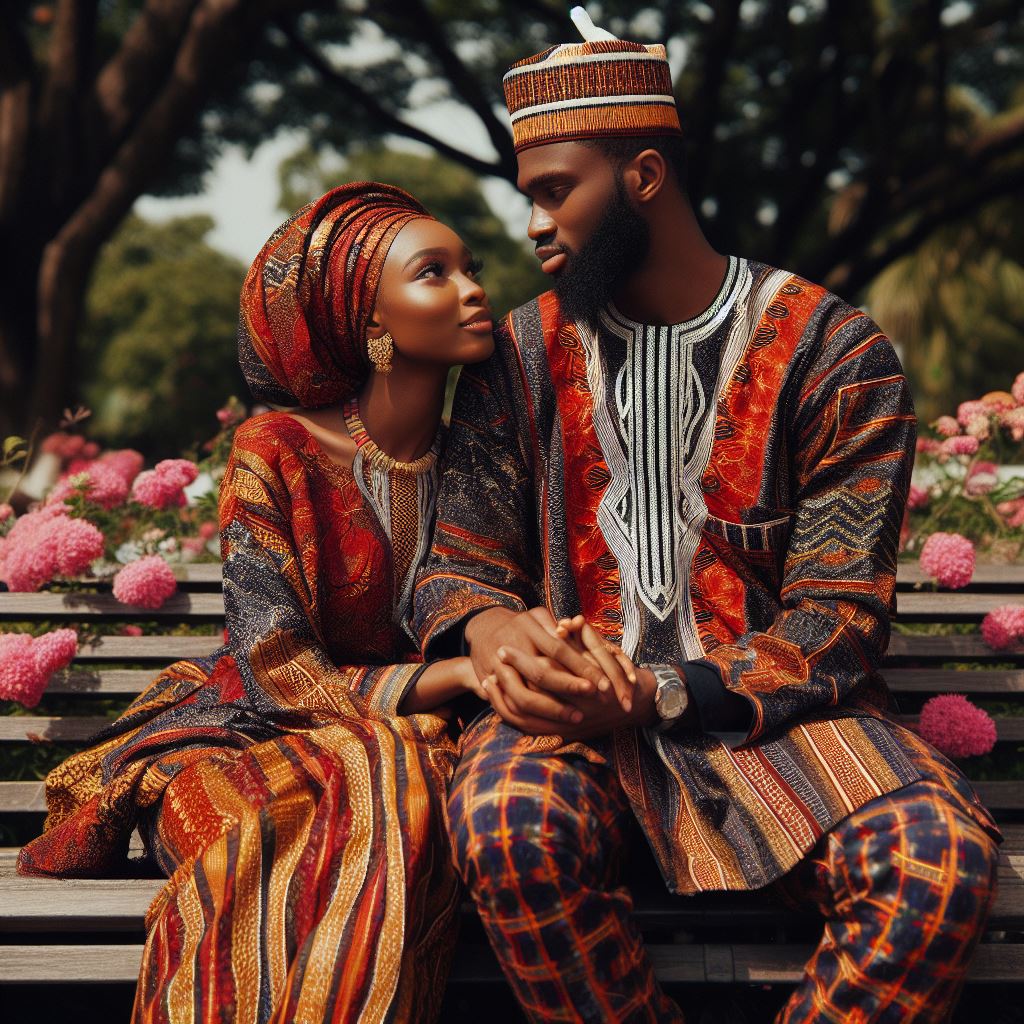
Controversies and Challenges
In discussing the practice of dowry (mahr) in Islam, it is important to acknowledge the controversies and challenges surrounding it.
Various criticisms have been raised against dowry practices in Islam, especially in relation to its impact on women’s rights and their position within marriage.
Criticisms against dowry practices in Islam
Firstly, critics argue that dowry reinforces gender inequalities within marriage.
They argue that the expectation of a dowry places financial burdens on the bride’s family, perpetuating a system that treats women as commodities to be bought and sold.
This viewpoint often stems from a feminist perspective that advocates for gender equality in all aspects of life, including marriage.
Feminist perspectives on dowry and gender equality in marriage
Feminist perspectives on dowry emphasize the importance of distinguishing between traditional practices and religious principles.
They argue that Islam promotes gender equality and that dowry practices can be adapted to reflect this principle.
Feminists argue for mutual consent between the spouses and stress the need for transparency in discussing dowry arrangements.
Instances of misuse or exploitation of dowry system
Instances of the misuse or exploitation of the dowry system also present a significant challenge.
In some cases, dowry has become excessive and materialistic, with exorbitant demands being placed on the bride’s family.
This creates financial strain and contributes to the objectification of women.
Efforts to reconcile Islamic principles with societal changes
Efforts actively reconcile Islamic principles with societal changes to tackle these challenges.
Scholars and activists have called for reinterpretation of religious texts to ensure that dowry practices align with Islamic values of justice and fairness.
They assert that we should interpret the concept of mahr in its original context. The groom gives it to the bride as a symbol of commitment and responsibility.
Educational programs and awareness campaigns actively challenge harmful dowry practices while educating people about mahr’s true purpose.
These initiatives aim to empower women and enable them to exercise their rights within the framework of Islamic teachings.
In general, the controversies and challenges surrounding dowry practices in Islam highlight the need for critical examination and adaptation.
By addressing criticisms, incorporating feminist perspectives, and promoting education, it is possible to reconcile Islamic principles with societal changes and foster a more equitable and respectful marriage system.
Read: From Singlehood to Married Life: A Nigerian Journey Explored
Conclusion
Recap of key points discussed in the blog post
We have explored the meaning and Nigerian practices of dowry (mahr) in Islam.
We discussed how dowry is a form of financial security for the bride and serves as a symbol of commitment from the groom.
Additionally, we examined the different components of dowry, including the gift, monetary payment, and the importance of consent in the process.
Importance of understanding the meaning and Nigerian practices of dowry in Islam
Understanding the significance of dowry in Islam is crucial in appreciating the cultural traditions and the mindset behind this practice.
By delving into these traditions, we can gain a deeper understanding of the values and principles that form the foundation of the Muslim community in Nigeria.
This understanding ultimately fosters respect and empathy towards different cultures and traditions within Islam.
Encouragement to respect cultural diversity and promote healthy discussions about dowry customs
Engaging in respectful and open discussions about dowry customs can help bridge the gap between cultural differences and promote tolerance and appreciation for diverse perspectives.
It is essential to approach these discussions with an open mind, seeking to learn and exchange ideas, rather than imposing judgments or stereotypes.
By doing so, we can create a more inclusive society that celebrates and respects cultural diversity.

